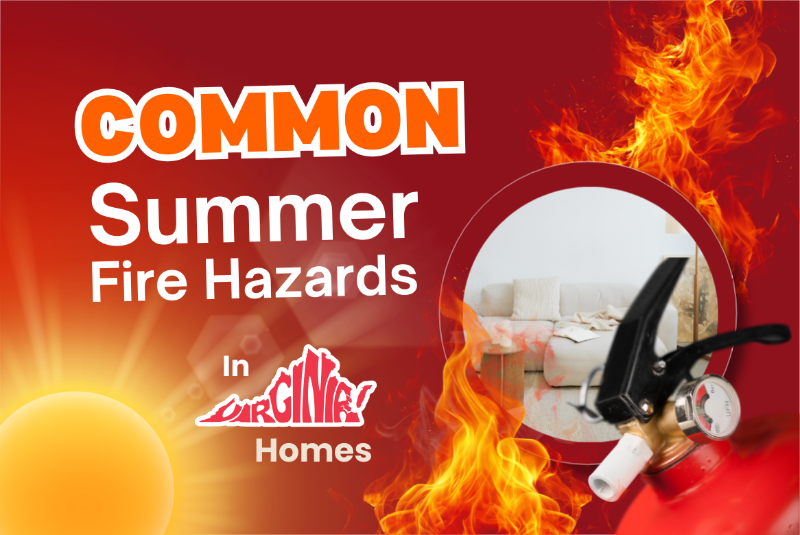As the warm sun graces Virginia with its vibrant summer days, many homeowners are inclined to soak up the season’s joys—barbecues, bonfires, and outdoor gatherings. However, with these delightful activities come hidden risks. Summer fire hazards can easily transform a joyful occasion into a devastating disaster if not handled with care. From overlooked grilling practices to improper storage of flammable materials, the potential for fire-related incidents often lurks beneath the surface. In this article, we’ll explore common summer fire hazards that Virginia homeowners face and provide expert solutions to help you safeguard your property and loved ones. Whether you’re a grilling enthusiast, a homeowner, or simply someone who loves enjoying the outdoors, understanding these risks and the effective strategies to mitigate them is essential for ensuring a safe and enjoyable summer season. Let’s dive in and arm ourselves with the knowledge needed to stay safe while making the most of this beautiful time of year. For weather-driven risks that also threaten homes, see our guide to Virginia seasonal flooding causes.
Understanding the Climate: Why Summer Increases Fire Risks
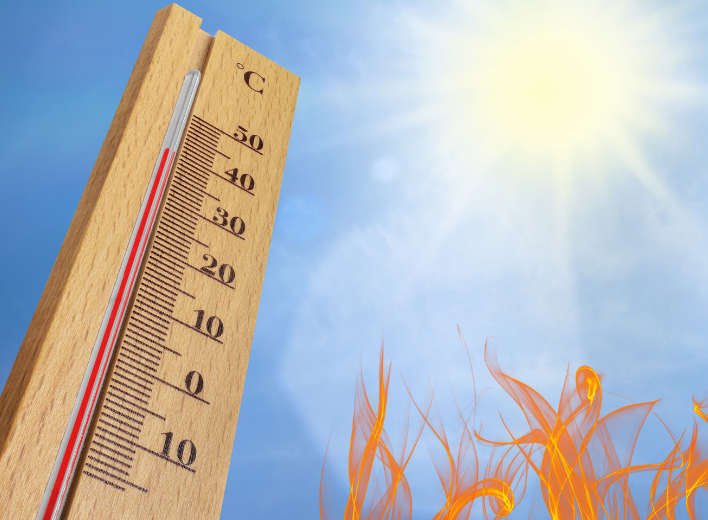
Virginia’s summer climate is characterized by high temperatures, increased humidity, and occasional dry spells. These weather conditions create an environment ripe for fire hazards. The scorching heat dries out vegetation, turning lush greenery into tinder that can ignite with the slightest spark. Coupled with the prevalent use of outdoor cooking equipment and recreational fires during this season, the potential for accidental fires rises significantly. This means homeowners must be extra vigilant about fire safety during the summer months to prevent unexpected disasters.
Moreover, summer brings frequent thunderstorms, and while the rains can dampen the soil, lightning strikes pose a significant fire risk. Lightning can ignite dry grass or trees, leading to wildfires that can spread rapidly, especially in rural or wooded areas. Additionally, power surges caused by lightning strikes can damage electrical systems within homes, further increasing the risk of electrical fires. Understanding the interplay between summer weather patterns and fire risks is crucial for effective fire prevention strategies.
The combination of human activities and natural elements during summer creates a perfect storm for fire hazards. Outdoor gatherings, such as barbecues and bonfires, often involve the use of open flames or hot surfaces, which can easily ignite nearby flammable materials. Similarly, the increased use of air conditioning units and other electrical appliances to combat the heat can lead to overloaded circuits and potential fire hazards. By recognizing the seasonal factors that elevate fire risks, homeowners can take proactive measures to mitigate these dangers and ensure a safe summer season.
Common Summer Fire Hazards in Virginia Homes
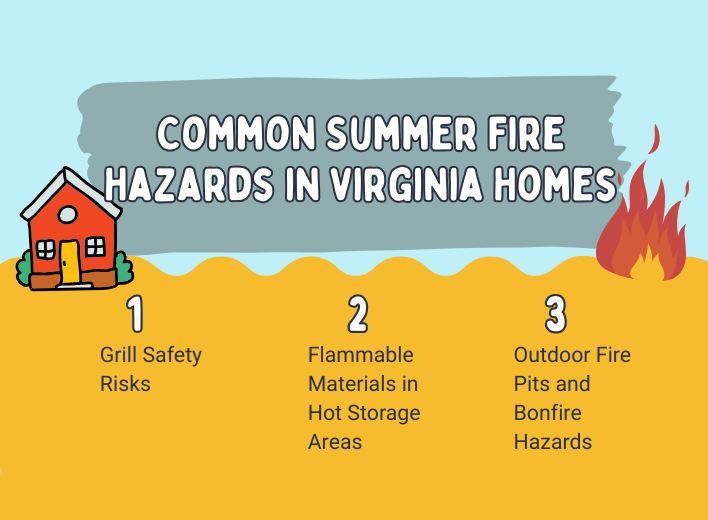
Summer brings warmer weather and more outdoor activities, but it also increases the risk of household fires. Understanding the most common hazards can help homeowners in Virginia stay safe and protect their property.
Grill Safety Risks
Grills are a staple of summer gatherings, but they can be dangerous if not properly maintained. If a cookout gets out of hand, learn immediate next steps in restoring your home after fire damage. Grease buildup, loose gas connections, or placing the grill too close to siding, decks, or overhanging branches are frequent causes of house fires. To reduce risks, homeowners should clean their grills regularly, check for leaks before each use, and always cook on a stable, non-flammable surface positioned away from the home.
Flammable Materials in Hot Storage Areas
Many Virginia homeowners store gasoline, lighter fluid, fireworks, and other flammable materials in garages or sheds. After any smoky incident, watch for warning signs of smoke damage. During summer, these spaces can reach extremely high temperatures, causing liquids to vaporize and increasing the risk of ignition. Storing these items in a cool, well-ventilated area and handling them carefully is essential to prevent accidental fires.
Outdoor Fire Pits and Bonfire Hazards
Fire pits and bonfires are popular summer activities, but they can quickly turn dangerous if not monitored closely. Leaving fires unattended, using accelerants like gasoline, or placing pits too close to vegetation or structures can spark uncontrolled blazes. Following local fire regulations, maintaining a safe clearance from combustible materials, and keeping water or a fire extinguisher nearby are critical safety practices. When damage occurs, always find a certified restoration contractor in Virginia.
Outdoor Fire Safety: Grills, Fire Pits, and More
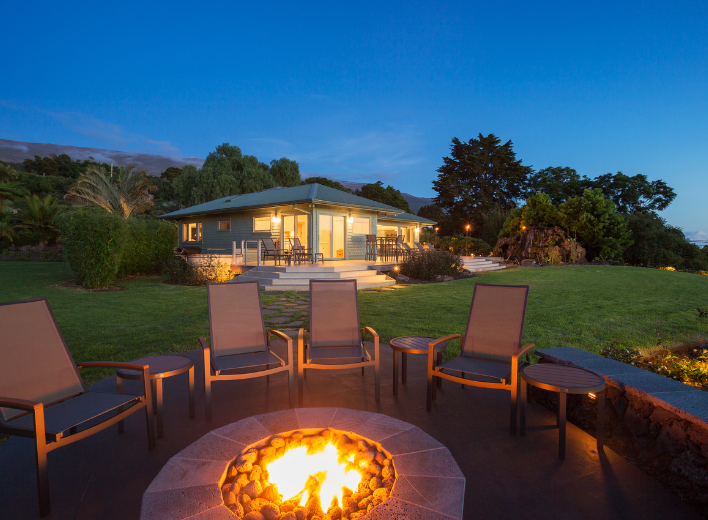
When it comes to outdoor fire safety, grills are often the centerpiece of summer gatherings, but they require careful handling to prevent accidents. Before lighting the grill, ensure it’s placed at least 10 feet away from any structures, including your house, deck, or overhanging branches. Always check for gas leaks in propane grills by applying a soapy water solution to the connections and looking for bubbles. For charcoal grills, use only approved charcoal starter fluid and never add it to a fire that’s already burning.
Fire pits and bonfires are popular for creating a cozy outdoor ambiance, but they come with their own set of safety considerations. Always choose a location for your fire pit that’s at least 15 feet away from buildings, trees, and any flammable materials. Use only dry, seasoned wood to reduce the risk of excessive smoke and sparks. Never use accelerants like gasoline to start a fire, as they can cause uncontrolled flare-ups. Keep a fire extinguisher, bucket of water, or garden hose nearby to quickly douse any stray embers or flames.
In addition to grills and fire pits, outdoor electrical equipment such as lawnmowers, string trimmers, and other power tools can also pose fire hazards. Post-storm yard work can spark fires; know what to expect during home restoration. Ensure that these devices are in good working condition and free from debris that could ignite. Avoid using electrical equipment during dry, windy conditions, as sparks can easily start fires in dry grass or leaves. Proper maintenance and mindful use of outdoor tools can significantly reduce the risk of accidental fires.
Indoor Fire Hazards: Air Conditioning and Electrical Equipment
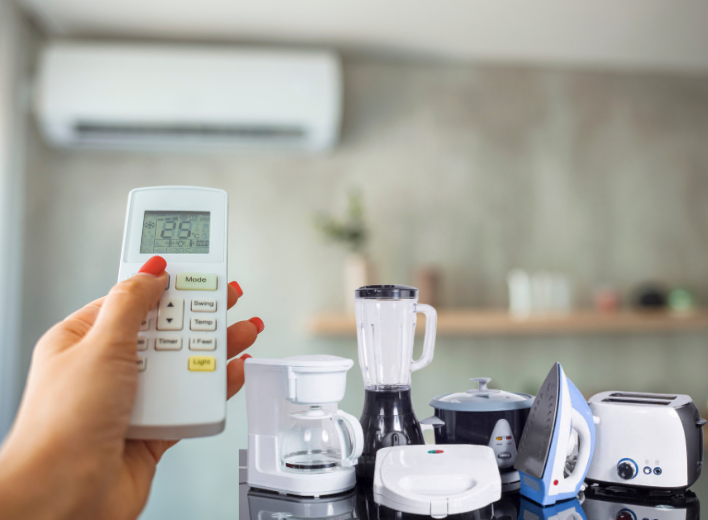
During the sweltering summer months, air conditioning units become essential for maintaining a comfortable indoor environment. However, they can also be a source of fire hazards if not properly maintained. Over time, dust and debris can accumulate in the filters and vents, causing the unit to overheat and potentially catch fire. Regularly cleaning and servicing your air conditioning unit can prevent such issues and ensure it operates safely and efficiently.
Electrical equipment and appliances see increased use during the summer, which can strain your home’s electrical system. Overloaded circuits and outdated wiring are common culprits behind electrical fires. It’s essential to avoid using too many high-wattage appliances simultaneously and to check the condition of your home’s wiring, especially if it’s an older property. Consider having a licensed electrician inspect your electrical system to identify and address potential hazards before they become serious issues.
Another indoor fire hazard during the summer is the use of fans and portable air conditioners. These devices can overheat if left running for extended periods, particularly if they are old or poorly maintained. Ensure that fans and portable AC units are placed on stable, heat-resistant surfaces and away from flammable materials such as curtains or furniture. If an AC leak or suppression runoff soaks floors, try these tile and floor cleanup tips after water damage. Regularly inspect the cords and plugs for any signs of wear or damage, and replace them immediately if needed to prevent electrical fires.
The Importance of Smoke Alarms and Fire Extinguishers
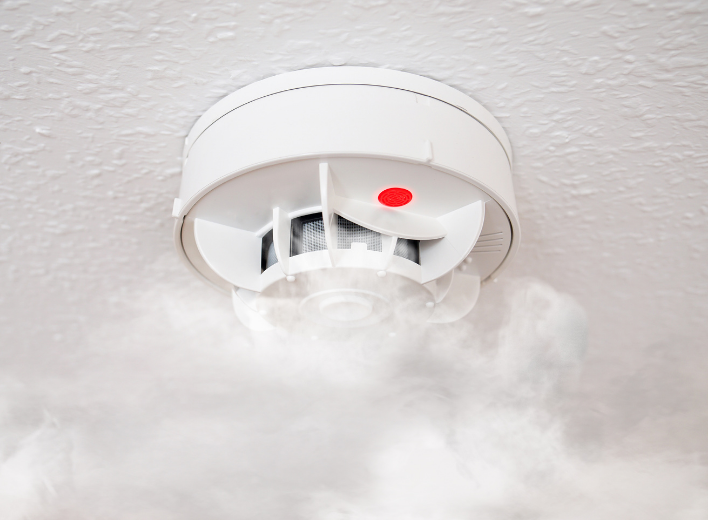
Smoke alarms are a crucial component of any home fire safety plan, providing an early warning that can save lives and minimize property damage. After small fires, use this post-fire home inspection checklist to spot hidden issues. During the summer, when the risk of fire is heightened, it’s especially important to ensure that your smoke alarms are functioning correctly. Test them monthly and replace the batteries at least once a year. If your smoke alarms are more than 10 years old, it’s time to replace them entirely to ensure they remain effective.
Fire extinguishers are another essential tool for preventing small fires from becoming major disasters. Every home should have at least one fire extinguisher, ideally placed in high-risk areas such as the kitchen, garage, and near outdoor grilling areas. Familiarize yourself with the different types of fire extinguishers and their uses, and ensure that all household members know how to operate them. Regularly check the expiration date and pressure gauge to ensure the extinguisher is ready for use in an emergency.
In addition to smoke alarms and fire extinguishers, consider installing carbon monoxide detectors, especially if you use gas appliances or have an attached garage. Carbon monoxide is a colorless, odorless gas that can be deadly in high concentrations. Like smoke alarms, CO detectors should be tested regularly and replaced according to the manufacturer’s recommendations. By equipping your home with these essential safety devices, you can significantly reduce the risk of fire-related injuries and fatalities.
Expert Solutions for Preventing Summer Fires
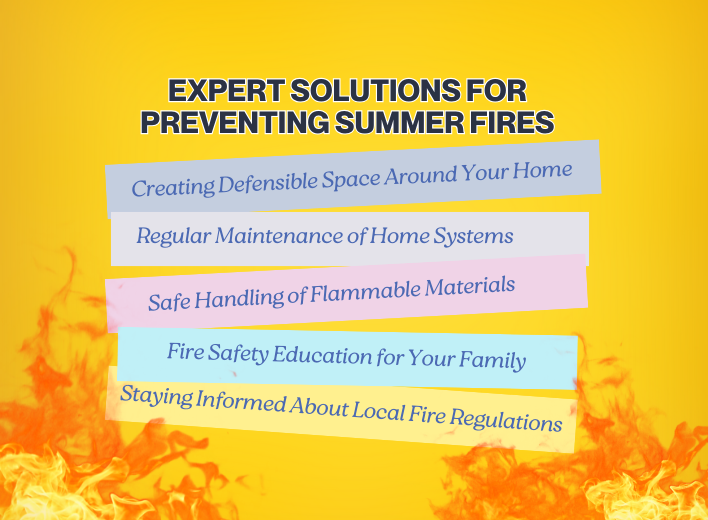
Preventing summer fires is essential for protecting homes and communities. Plan ahead with a realistic budget using our breakdown of the true cost of flood restoration in VA. Proactive planning, routine maintenance, and awareness of local fire hazards help minimize risks, ensuring a safe environment for families while reducing potential damage from accidental or natural fires.
Creating Defensible Space Around Your Home
One of the most effective strategies is creating a defensible space by clearing dead vegetation, trimming trees, and keeping flammable materials away from your home. This buffer slows fire spread and improves safety for both occupants and firefighters.
Regular Maintenance of Home Systems
Routine inspections of HVAC systems, electrical wiring, and chimneys prevent potential fire hazards. Addressing worn or faulty equipment promptly reduces the likelihood of accidental fires, ensuring your home remains safe during the high-risk summer months.
Safe Handling of Flammable Materials
Proper storage and use of flammable substances, such as propane, gasoline, and cleaning chemicals, is crucial. Educating family members on safe practices minimizes accidental ignition and strengthens your home’s overall fire safety.
Fire Safety Education for Your Family
Teaching fire safety, including proper cooking practices and emergency protocols, ensures that everyone in your household knows how to react during a fire. Awareness and preparation significantly reduce injury risks and property damage.
Staying Informed About Local Fire Regulations
Monitoring local burn bans, fire weather warnings, and community advisories helps you comply with safety regulations. Following these guidelines prevents accidental fires and promotes a safer summer environment for your neighborhood.
Resources for Fire Safety Education in Virginia
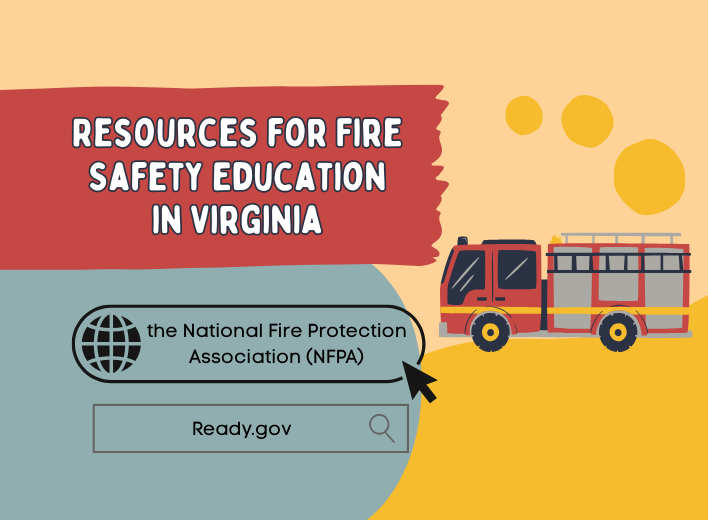
Virginia offers a wealth of resources for homeowners looking to enhance their fire safety knowledge and skills. Local fire departments often provide educational programs and materials on fire prevention, including information on creating defensible spaces, maintaining fire safety equipment, and developing emergency plans. Many departments also offer free or low-cost smoke alarm installation and inspection services to ensure that your home is adequately protected.
The Virginia Department of Fire Programs (VDFP) is another valuable resource for fire safety education. The VDFP offers a variety of training courses, workshops, and certifications for both professionals and the general public. These programs cover topics such as fire prevention, firefighting techniques, and emergency response. By participating in these educational opportunities, you can gain a deeper understanding of fire safety and learn how to protect your home and family more effectively.
Additionally, numerous online resources provide valuable information on fire safety best practices. Websites such as the National Fire Protection Association (NFPA) and Ready.gov offer comprehensive guides, checklists, and instructional videos on a wide range of fire safety topics. By utilizing these resources, you can stay informed about the latest fire safety recommendations and ensure that you are taking all necessary precautions to prevent fires in your home.
Conclusion: Staying Proactive About Fire Safety
As Virginia homeowners embrace the joys of summer, it’s crucial to remain vigilant about fire safety. Understanding the unique fire risks associated with the summer season and taking proactive measures to mitigate them can make all the difference in preventing accidents and ensuring the safety of your loved ones. From maintaining grills and storing flammable materials properly to installing and regularly testing smoke alarms and fire extinguishers, every step you take towards fire prevention contributes to a safer home environment.
Education and preparedness are key components of effective fire safety. By staying informed about local fire regulations, participating in fire safety training programs, and practicing emergency escape plans, you can equip yourself and your family with the knowledge and skills needed to respond quickly and effectively in the event of a fire. Remember, the time and effort you invest in fire safety now can have a lasting impact on your family’s well-being and peace of mind.
Ultimately, the goal is to enjoy all that summer has to offer while minimizing the risks associated with fire hazards. By adopting a proactive approach to fire safety and making it a priority in your daily routines, you can create a safe and enjoyable environment for everyone. Stay safe, stay informed, and savor the beauty of Virginia’s summer season with the confidence that you are well-prepared to handle any fire-related challenges that may arise. For immediate help after sprinklers, hoses, or storms, contact 24/7 water damage restoration in Virginia for fast extraction and dry-out.

